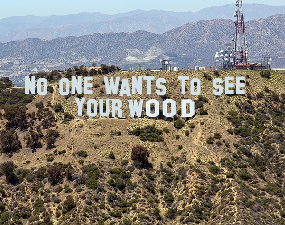Today I’m going to address the issue of what have become known as “Safe(r) Spaces” at conventions. These are, more often than not, enclaves set aside for various minority groups attending conventions so that they can have a place free from the stresses of the maddening crowd.
Most of the complaints about such things I’ve been reading of late take two general forms: “that’s exclusionary and discriminatory and they’re being hypocrites for demanding such things” or “the convention itself is/should be a safe space for everyone…we’re all about inclusion…”
Not to mention the third, sotto voce complaint that the “privileged” aren’t being “privileged” and are unhappy to be feeling the way many minorities do when out and about in mainstream culture.
Which is the real hypocrisy.
My personal feeling is that this is only an issue for some non-minority folks because these are safe(r) spaces for minorities. I don’t ever recall hearing anyone complaining that they can’t get into the green room because they aren’t presenters or guests; never heard anyone complaining that they can’t get into the SFWA suite because they aren’t members. I myself have been at convention hotels without being a member of the convention. I never complained that I couldn’t get in.
This is the way it has always been at conventions. There are open parties and closed parties. Special events for groups that are not necessarily open to all attendees; there was even a time when you had to buy an extra ticket to participate in all of the Hugo Awards ceremony events. You can’t go in to the ballroom when they’re preparing for the costume contest, unless you’re working on it or in it. You can’t attend con-com meetings unless you’re a member.
I’ve got nearly 200 people associated with Amazing Stories in one fashion or another. If they all attended the same convention, they would represent a sizable minority of all of the attendees. If I rented a suite for the “Amazing Stories Team and Guests” and asked the program people to publicize it so that everyone qualifying knew where the Amazing Suite was and when it was open – how many complaints would the convention get for offering an exclusionary space?
Few if any is my guess.
How is that different from any other group that has some external commonality getting a room for their “exclusive” use?
It isn’t, with one possible exception: most of the Amazing Stories Team wandering around a convention aren’t subject to unconscious bias or unintentional micro-aggressions. (I use unintentional and unconscious here to put as good a face on things as possible.)
And please, stop already with the BS “they’re being discriminatory” thing. If you are cis het white male, the whole rest of the convention is your “safe(r) space”. This is not a case of hypocrisy, it is an attempt to level the playing field.
I would be very happy indeed if conventions were able to achieve the fannish ideal of being open and welcoming and comfortable for all attendees, all of the time. This is the goal we are striving for. Safe(r) Spaces are a step towards that goal. If you don’t like it, get over yourself.
Steve Davidson is the publisher of Amazing Stories.
Steve has been a passionate fan of science fiction since the mid-60s, before he even knew what it was called.










It’s a thorny problem.
The first time I heard of ‘safe spaces,’ it was in the context of university students complaining about having to listen to ideas they didn’t like. I was not impressed and that coloured my reaction to every other ‘we want a safe space’ whine. If you’re not mature enough to understand that people might have different opinions to yourselves – or secure enough in your own beliefs to listen to criticism – you really shouldn’t be considered legal adults.
In this sense, safe spaces are a step towards outright censorship. Just as your university doesn’t force you to attend guest lectures, conventions don’t force you to attend panels. I don’t think that anyone has the right to demand that someone be removed from a panel and barred from conventions. It’s a slippery slope and one we shouldn’t go down.
At the same time, I can understand the importance of having a place for you and yours … but people can be hypocrites over it. If you can have a women-only society, why can’t you have a men-only society? If you can have a blacks-only society, why not a whites-only society? And then there’s the question of public funds – I’d accept a privately-funded exclusionary group, but not one publically-funded.
Frankly, I’ve noticed that most activists who opinion on this issue want to have their cake and eat it too.
A chess club that refused to admit women would be pretty stupid, but – at the same time – it would be quite within its rights to insist that the newcomers actually PLAYED CHESS.
Chris
Chris, the basic response will (and has pretty much always been): because whites have an entire society that is their “safe space” and men have an entire society that is their “safe space”.
I’ll refer you to this piece by John Scalzi: https://whatever.scalzi.com/2012/05/15/straight-white-male-the-lowest-difficulty-setting-there-is/
Really? My childhood and teenage years were ‘safe’? Gosh. I never realised that … probably because they weren’t. But then, I suppose being beaten up every day – and being told I would amount to nothing, and battling learning disabilities, and far too much else – is better than facing micro-aggressions.
Seriously. That post annoyed me. Scalzi knows nothing about my life – or the lives of many others – and yet he thinks my life was lived on the ‘lowest disability setting’? I’ve spent too much of my life being marginalised, yet he wants me to believe that I lived a life without difficulty?
You’re taking a special case and applying it to a discussion that deals with the issue in general. Nothing in that piece claims that everything stated applies to every person individually.
In another comment (On Last Jedi), you’re doing the same thing in reverse; applying a general assessment to all of Clinton’s supporters.
It’s a well-known game and a pretty typical way for those evincing right-leaning viewpoints to argue – identifying something you view negatively and broadly applying it to an entire made-up class of people; and then, in turn about, objecting to generalized statements on the grounds that there’s some particular detail that doesn’t apply to you individually, therefore the entire argument is null and void.
You generally seem to identify with a political viewpoint that seems to want to insist that there is no such thing as a gray area, that there can be no nuance to someone’s position, when, in fact, the real world is nothing but gray. Individuals are not avatars for whatever (negative) political position you want to create and then shoot down.
Well, no. But the post is generalistic enough to make me think that it applies to all straight white males. And yet, I know plenty of straight white males (myself included) who have had some very difficult lives. And yes, I’ve also known plenty of non-straight-white-males who have had easier lives than me. The unspoken truth behind the myth of white privilege is that you can be a straight white male and still have a very difficult life.
The blunt truth is that, if you explain to a poor white man that he has white privilege, he’ll laugh in your face. And he will be right. He hasn’t seen much privilege in his life, so he’ll just feel you’re either completely out of touch or having a go at him. You might be right, from some objective point of view, but subjectively you’d be wrong.
(It would probably be better to class the whole thing as class privilege. But even that has its limits.)
That said, it is very difficult to generalise. Which is what you did, when you asserted that the entire world was a ‘safe space’ for straight white males. And I don’t buy that argument because I – and many others – have never found the world a safe space.
I think we have different ideas of which areas are black and white and which areas are rather more nuanced. If you want to have a women-only club, as I asked above, why can’t you have a men-only club? Either you can have clubs that discriminate on such matters or you can’t – or you’re a hypocrite, giving one group/faction/whatever a right that the others don’t share.
Like I said in the other post, we have lost the ability to tell the difference between reasoned disagreement and trolling (or worse). We have started to believe that something is true or false based on who said it, rather than any rational assessment of the truth; we have started to lash out at people who disagree with us, rather than giving them room to retreat; we have started to drive people out for having opinions that are no longer PC. And so we are caught in a vicious whirlpool where the right is now doing to the left what the left did to the right because the right did it to the left … and so on, because we seem to have forgotten that we need to live together.
I totally respect the wish of people to be ‘safe.’ But I don’t think that ‘safe spaces’ which encourage division (and hamper intellectual development, in the case of colleges) are the way to go about it.
Chris
You need to change the yard stick you are using. You state “explain to a poor white man that he has white privilege, he’ll laugh in your face”, which is a yardstick of comparing whites to whites. What you need to compare (in this particular instance) is poor white man vs poor minority man. Your poor white trash has it shitty, your poor black man has it even shittier.
You CAN have your men’s only club, and if it confers any special privilege on the individual members, you can expect it to be criticized.
Sometimes it’s really nice to go somewhere where you’re not a minority. I remember the first big gay event I attended (1978 March on Washington) and the biggest thing people were talking about was how different it felt to not be the minority, even if only for a few hours.
Heck, the big appeal of conventions for fans is that we get to go somewhere where we’re not the minority, even if just for a few days. So we ought to understand how members of a minority would enjoy a place they could go, if they felt like it, to take a break from being a minority.
That does suggest that a general “POC Safe Space” might not work. You might need one for black people, one for Hispanics, one for Asians, etc.
I distinctly remember heaving a big sigh of relaxation after I registered and looked around the lobby at my first convention. I was surrounded by “my people”. Sure, some of them looked funny, or acted funny, but that was just surface. Each and every one of them was “just like me”. They watched Star Trek, talked Star Trek, wore Star Trek, read Star Trek, collected Star Trek, argued Star Trek, lived Star Trek. (I’m guessing you’ve figured out it was a Star Trek convention.) Everything I looked at, everything I heard – Trek. With enthusiasm and joy and unfettered openness – even the stars (this was before velvet ropes and fees).
I pass as white, despite not being one. I’ve had the minority experience while being in a position to avoid most of it. And even I find at times that I need to “get out” and decompress. That’s usually by retreating to my hotel room or taking a walk outside the hotel (I’m more introverted than extroverted), so I can understand the need to get away, even if it isn’t due to anything other than being overwhelmed.
Besides, as I pointed out in this piece, there’s plenty of non-minority based “exclusionary” spaces at conventions and always has been. Requesting a safe space for a minority group is, as suggested, a step in the right direction. Those groups WANT to be at the convention and are doing what’s necessary to make it possible for them to attend in comfort.
Given the discussions I’ve had with many artists at cons, it might be a good idea for them to ask for their own space, by way of another appropriate example. (One I just thought of and should have been in the post.)